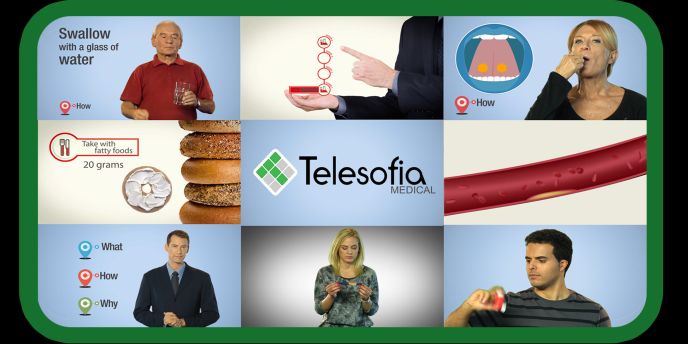Nine out of 10 Americans do not understand medical instructions from doctors and pharmacists, and 80 percent find hospital discharge orders confusing. Even more troubling, every five minutes, seven Americans seek emergency care due to an error with their medication.
Israeli physician Dr. Rami Cohen believes he has a prescription for this malady of misunderstanding: Telesofia Medical, his new proprietary platform for healthcare workers to easily create personalized instructional videos for patients.
“Sitting in front of the physician or pharmacist or nurse is probably the worst scenario in which to learn something new,” he tells ISRAEL21c.
“Patients are either in pain or just learned they have a disease, and that prevents them from paying careful attention as doctors bombard you with papers and jargon and a lot of technical stuff. That’s why so many people can’t really absorb it.”
Health practitioners can use Telesofia’s bank of clips and graphics to generate –completely automatically or with a few clicks — instructional videos using data from the patient’s electronic medical records and from a digital library of data on more than 4,000 pharmaceuticals. The video can be made in not much more time than it takes to print out a prescription.
“As a physician, I know there’s no time to spend on generating a video, so we tried to make it as automatic as possible,” says Cohen, who has spent almost two decades helping startups with product development, launching, marketing and management.
Patients simply access the video by clicking a link that arrives in a text message, QR code, email or whatever form the patient prefers. There is no need to install a flash player or an app. “Everything is done on the server side,” says Cohen.
The content is geared to a sixth- or seventh-grade literacy level, and can support any language. Currently it is available in English, with a Spanish version coming soon. Hebrew and Arabic will follow.
The Telesofia platform can be used to explain visually a surgical procedure, treatment regimen, lab results, medication usage, discharge instructions and home care.
Patients who grasp this information well are less likely to end up back in the hospital, Cohen points out.
“Misunderstanding creates readmissions or a ‘revolving-door’ syndrome,” he says.
Overuse of the healthcare system leads to a loss of anywhere between $106 billion to $236 billion every year in the United States alone, and new US regulations penalize hospitals for avoidable readmissions.
Cohen sees Telesofia’s product as an answer to this problem, and apparently investors agree; the company has raised $1.5 million since launching the service last spring. The company, founded in 2011, has an R&D center in Tel Aviv and a business office in the United States, its main target market.
With support from Israel’s Office of the Chief Scientist of the Economic Ministry, Telesofia is working to develop a product aimed specifically at reducing readmissions: a series of timed videos explaining what to do at home, augmented by personalized text messages and automatic phone calls.
“It creates a tool to educate you at home in autopilot mode,” says Cohen. “A lot of treatments that patients used to get in the clinic or hospital setting are now done at home; even chemotherapy. You’re talking about very complex medications being administered by the patient at home, not just swallowing a pill.”
One of the company’s first major clients for the video platform is a corporate wellness company in California.
“We are measuring usage and gathering statistics on how patients watch the videos, and we are planning several pilots to measure the effect of the system,” says Cohen.
As for the business model, Telesofia generates revenue by charging a nominal setup or integration fee, as well as a recurring fee for each use.
“It is paid by the one making and sending the video,” Cohen stresses. “Our goal is to keep it always free for the patient.”
















